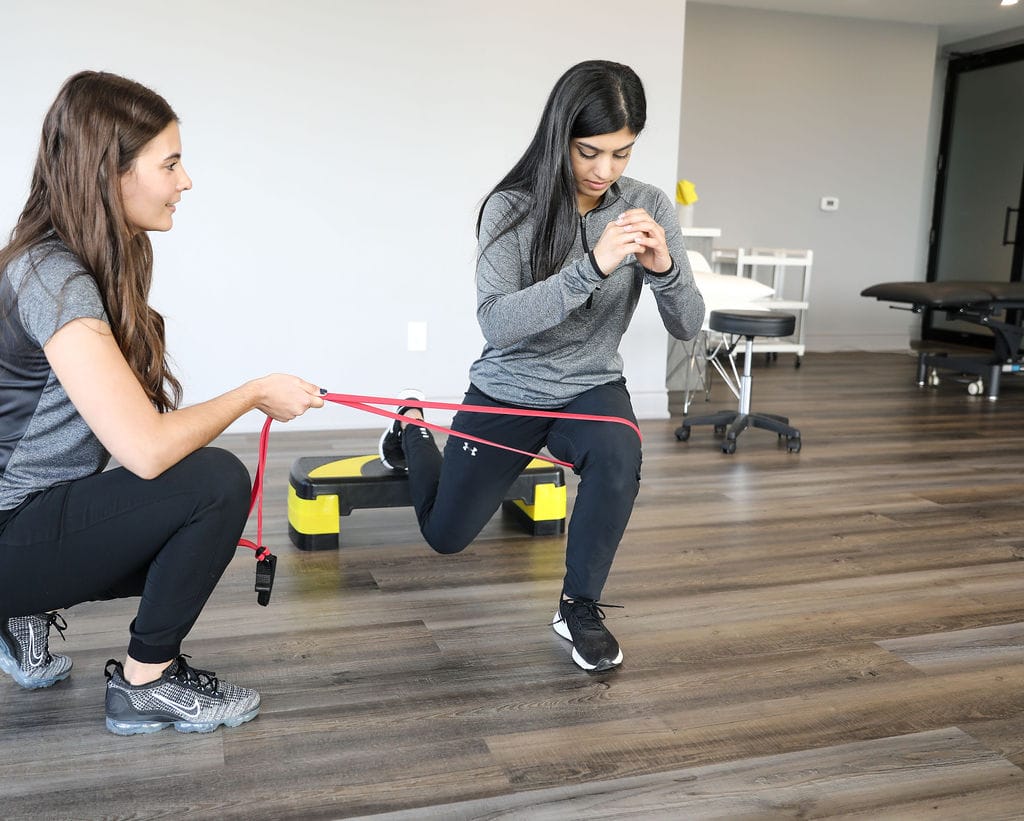✔️ Physiotherapy absolutely works!
Physiotherapy is a legitimate and effective healthcare practice that aims to improve and restore physical function and mobility, reduce pain, and enhance overall well-being. It is commonly used to treat a wide range of conditions, injuries, and illnesses. Physiotherapists, also known as physical therapists, are trained healthcare professionals who use various techniques, exercises, and modalities to help patients recover from injuries, manage chronic conditions, and improve their physical capabilities.
What is Physiotherapy?
- Physiotherapy is used to help people affected by injury, illness, or disability through movement, exercise, manual therapy, education, and advice.
- At Triangle Physiotherapy, we work in partnership with our patients to help them recover and stay well.
- We use advanced techniques along with evidence-based care. The utilization of these skills allows our physiotherapists to assess, diagnose, treat, and prevent a wide range of health conditions and movement disorders.
What are the benefits of physiotherapy treatment?

- Injury Rehabilitation: Physiotherapists play a crucial role in rehabilitating injuries, such as sprains, strains, fractures, and surgeries. Physiotherapists develop personalized treatment plans to help patients regain strength, flexibility, and mobility.
- Pain Management: Physiotherapy techniques, including manual therapy, massage, and therapeutic exercises, can help reduce pain and discomfort associated with musculoskeletal issues, neurological conditions, and chronic pain.
- Neurological Conditions: Physiotherapy is used to improve motor function, balance, and coordination in individuals with neurological conditions such as stroke, Parkinson’s disease, multiple sclerosis, and spinal cord injuries.
- Cardiopulmonary Rehabilitation: Physiotherapy is involved in rehabilitating individuals with heart and lung conditions, helping them regain cardiovascular fitness and respiratory function.
- Posture and Ergonomics: Physiotherapists can provide guidance on maintaining proper posture and ergonomics to prevent musculoskeletal problems and discomfort.
- Sports Injuries: Physiotherapy is commonly used in sports medicine to treat and prevent sports-related injuries, enhance athletic performance, and aid in sports-specific training.
- Geriatric Care: Physiotherapy can help older adults maintain their independence, improve mobility, and manage age-related conditions like arthritis and osteoporosis.
- Pediatric Conditions: Physiotherapists work with children to address developmental delays, congenital conditions, and other pediatric issues that affect mobility and physical function.
- Preventive Care: Physiotherapists can provide education and exercises to prevent injuries and improve overall physical health and fitness.
- Pelvic Health: Pelvic Floor Physiotherapy refers to a specific and advanced field within physiotherapy that deals with Pelvic Floor Dysfunction. Pelvic Floor Dysfunction can impact people of any age or gender and the term describes several conditions that may affect the urinary, reproductive, digestive, sexual, and/or stability systems in the pelvis. Pelvic Health Physiotherapists have post-graduate training in pelvic health and can resolve many pelvic floor issues in people of all genders and ages.
- Cancer Rehabilitation: Cancer rehabilitation can help you to lessen and overcome these side effects and help you to participate in all your meaningful daily activities. The goal of cancer rehabilitation is to thus improve your daily function and physical and mental well-being both during and after your cancer treatments. Triangle Physiotherapy has trained physiotherapists that provide cancer rehabilitation services to help manage the common side effects of cancer and cancer treatment.
How do I get the most out of my Physiotherapy Appointment?
Getting the most out of your physiotherapy appointment involves effective communication, preparation, and active participation. Here are some tips to help you make the most of your physiotherapy session:
- Be Prepared:
- Write down your symptoms, concerns, and questions beforehand.
- Note any changes in your condition since your last appointment.
- Bring relevant medical reports, imaging results, or a list of medications you’re taking.
- Arrive Early:
- Arriving a few minutes early will give you time to complete any necessary paperwork and relax before your session.
- Effective Communication:
- Clearly describe your symptoms, their onset, severity, and any factors that worsen or alleviate them.
- Be honest about your lifestyle, activities, and habits that could impact your condition.
- Ask questions if you don’t understand something. Your physiotherapist is there to help you.
- Set Clear Goals:
- Discuss your goals with your physiotherapist. What do you want to achieve through physiotherapy? This could be pain relief, improved mobility, or functional goals.
- Follow Instructions:
- Listen carefully to the advice and instructions provided by your physiotherapist.
- Follow the recommended exercises, stretches, or home-care routines diligently.
- Ask Questions:
- Don’t hesitate to ask questions about your condition, treatment plan, exercises, or any concerns you might have.
- Understand Your Treatment Plan:
- Make sure you understand your treatment plan, including the goals, expected outcomes, and duration of treatment.
- Attend your Appointments Consistently: Your treatment plan may prescribe multiple sessions over weeks or months to achieve your health and recovery goals. Attend the sessions recommended by your physiotherapist in your treatment plan to ensure you can achieve the results you are looking for. Sometimes you may feel you are 100% better once your pain is gone but the underlying issue may not be completely resolved and you may risk a recurrence.
- Take Notes:
- Jot down key points, exercises, or recommendations during the session so you can refer back to them later.
- Feedback:
- Provide feedback to your physiotherapist about your progress and any changes you’ve noticed.
- Be Patient:
- Understand that progress may take time. Don’t get discouraged if you don’t see immediate results.
- Hygiene and Attire:
- Wear comfortable clothing that allows easy access to the area being treated.
- Maintain good hygiene, especially if your session involves physical contact.
- Engage Actively:
- Participate actively during the session. Follow your physiotherapist’s instructions and give your best effort during exercises.
Remember, your physiotherapist is there to help you achieve your goals and improve your health and well-being. By being proactive, engaged, and open in your communication, you can maximize the benefits of your physiotherapy appointments.
Which is the closest Physiotherapy clinic near me in Etobicoke?
Our physiotherapy center in Etobicoke is located at 1 The East Mall Crescent near Cloverdale Mall. The closest intersection is Dundas St. W & The East Mall Crescent.
What makes you different from all the other clinics that also provide physiotherapy services near me?
We have been trusted by the residents of the Greater Toronto Area with their physiotherapy needs for over 15 years and we have now become one of the best Physiotherapy clinics in the GTA with numerous reviews to prove it.
Our physiotherapists at our Etobicoke location are all registered physiotherapists and are dedicated in providing the best Physiotherapy service possible.
Why do I need to be treated by a registered physiotherapist?
It is of utmost importance to ensure that you are being seen by a registered Physiotherapist because behind every registered Physiotherapist yes years of academic and clinical training as well as extensive knowledge of all the systems of the human body. At our physiotherapy center, we guarantee that every single physiotherapist we have is registered and will take excellent care of you.
Is there a highly qualified physiotherapist at your physio clinic in Mississauga who you would recommend I see?
Our physiotherapy center in Mississauga has highly qualified professional physiotherapists with many years of experience. We have physiotherapists with FCAMPT designation, which is the highest certification in manual therapy.
We also have a team of highly skilled professionals including physiotherapists, massage therapists, acupuncturists, chiropractic doctors as well as naturopathic doctors. You are welcome to read their profiles on our website or call us for more information.
How do I book an appointment at a Physiotherapy Clinic near me?
Click HERE to book an appointment with a physiotherapist or chiropractor at one of our eight locations.
- Physiotherapy Etobicoke – Triangle Physiotherapy Etobicoke
- Oakville Physiotherapy Clinic – Triangle Physiotherapy Oakville
- Physiotherapy North York – Triangle Physiotherapy North York
- Mississauga Physiotherapy Clinics – Triangle Physiotherapy Mississauga
- Downtown Physiotherapy Clinics – Triangle Physiotherapy King West
- Uptown Physiotherapy Clinics – Triangle Physiotherapy Lawrence Park
- Physiotherapy Clinic Downtown Toronto – Triangle Physiotherapy Queens Quay
- Physiotherapy Clinics Mississauga – Triangle Physiotherapy Erin Mills
“Physiotherapy is an effective treatment for a wide range of conditions, helping individuals recover and improve their quality of life. Triangle Physiotherapy offers expert services across the GTA, including Physiotherapy in Etobicoke, Oakville, North York, Toronto, Lawrence Park, Queens Quay, Erin Mills, Mississauga, and Liberty Village. Our experienced physiotherapists are committed to helping you achieve your health goals through personalized and evidence-based treatments.”




